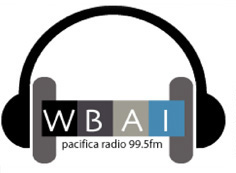When Superstorm Sandy hit New York, seawater reached up to the second floor of the building that houses Pacifica station WBAI in New York. The flooding ruined the building’s wiring and interrupted a fund drive at WBAI, leaving the station broke, homeless, and unable to raise money to get back on its feet. In a tremendous show of solidarity, all five Pacifica stations joined resources for a national day of fundraising to save WBAI on November 15th. The goal was to raise $150,000 to keep WBAI from going dark. The total raised surpassed $180,000.
 The emergency fundraiser was initiated by Letters and Politics host (and SaveKPFA endorser) Mitch Jeserich, who formerly worked on WBAI’s morning program. KPFA interim manager Andrew Phillips, who was formerly WBAI’s program director, executive-produced the broadcast. Pacifica interim executive director Summer Reese applied the political will necessary to get a national broadcast off the ground. SaveKPFA endorsers Laura Prives and Brian Edwards-Tiekert made major contributions to planning and executing the broadcast as well. KPFK in Los Angeles provided a fully-staffed call center to take the the pledges flooding in from around the country, and programmers from across the network contributed their very best to make the day a rousing success. Kudos to all involved!
The emergency fundraiser was initiated by Letters and Politics host (and SaveKPFA endorser) Mitch Jeserich, who formerly worked on WBAI’s morning program. KPFA interim manager Andrew Phillips, who was formerly WBAI’s program director, executive-produced the broadcast. Pacifica interim executive director Summer Reese applied the political will necessary to get a national broadcast off the ground. SaveKPFA endorsers Laura Prives and Brian Edwards-Tiekert made major contributions to planning and executing the broadcast as well. KPFK in Los Angeles provided a fully-staffed call center to take the the pledges flooding in from around the country, and programmers from across the network contributed their very best to make the day a rousing success. Kudos to all involved!
Of course, WBAI suffers from deeper problems than Superstorm Sandy: it’s locked into unaffordable leases on its studios and transmitter site, running its fund drives far too long, reaching a fraction of the audience it should in a metropolis like New York, and racking up serious deficits. But the emergency fundraising effort initiated from KPFA will prevent WBAI from going dark immediately, and will hopefully lay the groundwork for permanently stabilizing the station. You can still make a contribution here.


